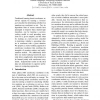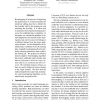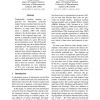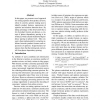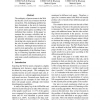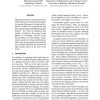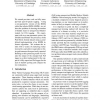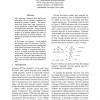103
click to vote
EMNLP
2009
15 years 6 days ago
2009
Traditional learning-based coreference resolvers operate by training a mentionpair classifier for determining whether two mentions are coreferent or not. Two independent lines of ...
132
click to vote
EMNLP
2009
15 years 6 days ago
2009
Bootstrapping is the process of improving the performance of a trained classifier by iteratively adding data that is labeled by the classifier itself to the training set, and retr...
EMNLP
2009
15 years 6 days ago
2009
This paper investigates the effect of direction in phrase-based statistial machine translation decoding. We compare a typical phrase-based machine translation decoder using a left...
118
Voted
EMNLP
2009
15 years 6 days ago
2009
This paper introduces a new parser evaluation corpus containing around 700 sentences annotated with unbounded dependencies, from seven different grammatical constructions. We run ...
139
click to vote
EMNLP
2009
15 years 6 days ago
2009
Traditionally, machine learning approaches for information extraction require human annotated data that can be costly and time-consuming to produce. However, in many cases, there ...
128
click to vote
EMNLP
2009
15 years 6 days ago
2009
In this paper, we present a novel approach for mining opinions from product reviews, where it converts opinion mining task to identify product features, expressions of opinions an...
111
click to vote
EMNLP
2009
15 years 6 days ago
2009
The ambiguity of person names in the Web has become a new area of interest for NLP researchers. This challenging problem has been formulated as the task of clustering Web search r...
EMNLP
2009
15 years 6 days ago
2009
This paper presents an investigation of the relation between words and their gender in two gendered languages: German and Romanian. Gender is an issue that has long preoccupied li...
124
click to vote
EMNLP
2009
15 years 6 days ago
2009
We extend previous work on fully unsupervised part-of-speech tagging. Using a non-parametric version of the HMM, called the infinite HMM (iHMM), we address the problem of choosing...
118
click to vote
EMNLP
2009
15 years 6 days ago
2009
Tree Adjoining Grammars have well-known advantages, but are typically considered too difficult for practical systems. We demonstrate that, when done right, adjoining improves tran...
